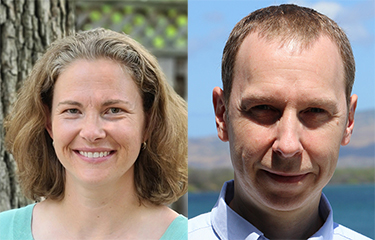NOAA has hired a new director of its Office of Science and Technology and director of its Office of Sustainable Fisheries.
Evan Howell, previously the deputy director for the Pacific Islands Fisheries Science Center, has been hired to head the Office of Science and Technology, where he will “advocate and ensure a sound scientific basis for NOAA Fisheries science programs and resource conservation and management decisions,” according to the agency. In his role, Howell will coordinate the work being done at six NOAA Fisheries science centers in the U.S. Northeast, Northwest, Pacific Islands, Southeast, Southwest, and Alaska.
“Throughout his career, Howell has demonstrated his leadership and participated in scientific research coupling physical and biological processes to better understand critical habitat and possible climate effects on highly migratory and protected species in the central North Pacific ecosystem, NOAA said in its release. “As part of this research, Howell authored or co-authored more than 30 peer-reviewed scientific papers and participated in 11 NOAA or scientific partner research missions.”
Howell has previous experience working at NOAA Fisheries, starting in 2002 in the Office of Science and Technology’s Fisheries and the Environment program. Howell has also managed the office’s Integrated Ecosystem Assessment program in Kona, Hawaii, served on the program’s founding steering committee, and represented the Pacific Islands on the Office of Science and Technology’s Public Access to Research Results implementation team. Howell has a bachelor’s degree in biology and chemistry from Antioch University, a master’s degree in marine and atmospheric chemistry from the University of Miami, and a doctorate in marine bioresource and environmental science from Hokkaido University.
“I look forward to joining S&T staff and Fisheries leadership to identify how the office can lead, partner on, and advance innovative and impactful science to support our mission now and through the future,” Howell said in a press release.
NOAA Fisheries Chief Science Advisor and Director of Scientific Programs for NOAA Fisheries Cisco Werner said Howell will play a key role in advancing his office’s role in using science to help manage U.S. fisheries.
“The NOAA Fisheries science enterprise provides the foundation for understanding the dynamics of our marine ecosystems. We build on this understanding to provide sound science advice for the sustainable management of our commercial and recreational fisheries and the conservation of our protected species,” Werner said. “Evan Howell has the responsibility to help guide our agency through rapidly evolving technological and scientific capabilities and maintain our global leadership role. I have every confidence Evan will successfully meet these challenges based on his many years in science and leadership roles.”
For its new director of its Office of Sustainable Fisheries, NOAA has selected Kelly Denit, another veteran of the agency. Denit previously served as the chief of the Domestic Fisheries Division in the Office of Sustainable Fisheries, offering policy direction and performance oversight to ensure the sustainable management U.S. fisheries in federal waters. Denit also worked for NOAA Fisheries overseeing state and federal partnerships to recreational fisheries, as well as conducting strategic planning and budgeting for catch share programs. Denit began her career at NOAA as a Knauss Sea Grant fellow in the Fisheries’ Office of International Affairs, and has also worked at the NOAA Ocean Service’s National Centers for Coastal Ocean Science in Beaufort, North Carolina.
Prior to joining NOAA, Denit was a senior policy advisor to the Under Secretary of Commerce for Oceans and Atmosphere. She has a bachelor’s degree from Yale University and a master’s in biological oceanography from the University of Miami.
“I am excited about the opportunity to lead NOAA Fisheries Office of Sustainable Fisheries and especially to engage with our stakeholders and partners in conserving fisheries resources for future generations,” Denit said. “One of the critical aspects of this new role will be supporting our fishing businesses and communities as they navigate through the challenges of COVID-19.”
In her new role, Denit will oversee a national office responsible for the implementation of the Magnuson-Stevens Fishery Conservation and Management Act, the management of Atlantic highly migratory species, and promoting U.S. seafood safety, while supporting seafood-related commerce and trade, NOAA said in a press release.
“She will work closely with Fisheries’ regional offices and science centers in partnership with the regional fishery management councils, interstate marine fishery commissions, and states to establish effective fishery management measures, set catch limits, ensure compliance with fisheries regulations, and reduce bycatch,” the agency said. “She will ensure office activities support agency priorities and work with key stakeholders – including the commercial and recreational fishing industries, tribes, academia, non-government organizations, and others – to advance those priorities around the country."
NOAA Deputy Assistant Administrator for Regulatory Programs Samuel Rauch III said Denit will play a key role in managing U.S. fisheries sustainably.
“U.S. fisheries are among the world’s largest, most valuable, and most sustainable as a result of the U.S. fishery management process,” Rauch said. “As our new lead for the implementation of the Magnuson-Stevens Act, Ms. Denit has a tremendous responsibility and I have every confidence she will rise to the challenge based on her experience and her extraordinary leadership skills.”
Photo courtesy of NOAA Fisheries







